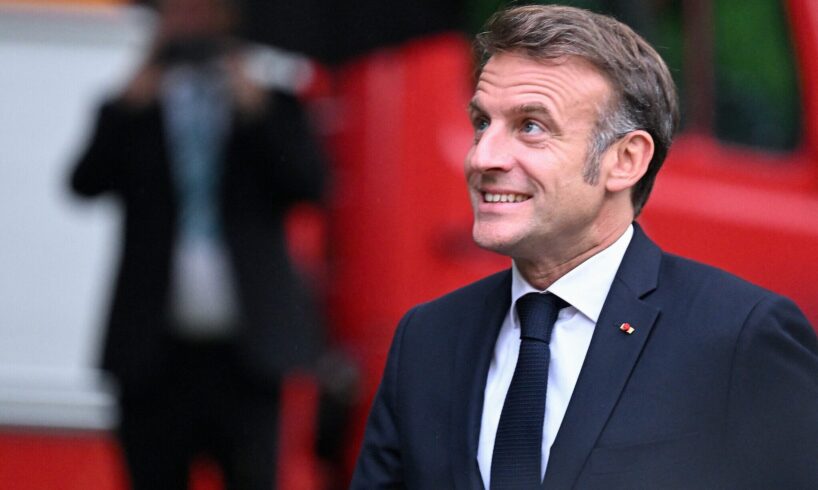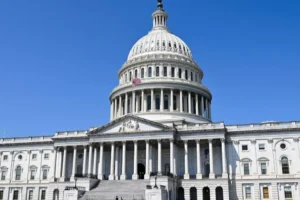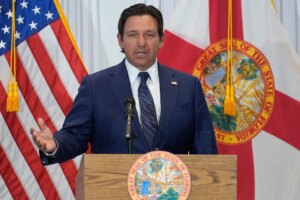
French President Emmanuel Macron’s announcement that France would become the first Western member of the United Nations Security Council to recognize a Palestinian state in September has caused diplomatic ructions from the Middle East through Europe to Washington.
But it did not come out of the blue.
When Macron visited the Egyptian town of El-Arish on the border with Gaza in April, he was struck by the mounting humanitarian crisis and made clear on his return home that Paris would soon opt for recognition.
Working with Saudi Arabia, Macron came up with a plan to have France, plus G7 allies Britain and Canada, recognize Palestinian statehood, while pushing Arab states to adopt a softer stance toward Israel through a United Nations conference. But despite weeks of talks, he failed to get others on board.
Three diplomats said London did not want to face the wrath of the United States, and Ottawa took a similar stance, leaving Macron to go it alone.
Get The Times of Israel’s Daily Edition
by email and never miss our top stories
By signing up, you agree to the terms
“It became increasingly apparent that we could not wait to get partners on board,” said a French diplomat, adding that France will work to get more states on board ahead of the conference on a two-state solution in September.
French President Emmanuel Macron (CR), Egyptian President Abdel-Fattah el-Sissi (R) and France’s Minister for Europe and Foreign Affairs Jean-Noel Barrot (CL) listen to Dr Amal Emam, CEO of the Egyptian Red Crescent (2nd L), as they visit Egyptian Red Crescent warehouses storing aid for Gaza, in the Egyptian border town of El-Arish, Egypt, on April 8, 2025. (Benoit Tessier / POOL / AFP)
Domestically, Macron was under rising pressure to do something amid widespread anger at the harrowing images coming out of Gaza. Although with both Europe’s biggest Muslim and Jewish communities and a polarized political landscape, there was no obvious course of action that would satisfy all sides.
Israel and the United States have blasted France’s move, branding it a reward for the Hamas onslaught of October 7, 2023, which triggered the war in Gaza.
Macron had discussed the matter in advance with both Prime Minister Benjamin Netanyahu and US President Donald Trump. On Friday, Trump said Macron’s decision to recognize Palestinian statehood didn’t “carry any weight,” but added that the French president was “a good guy.”
Conference plan
French officials previously considered an announcement at a conference scheduled for June at the United Nations, co-hosted by France and Saudi Arabia, to sketch out a roadmap to a viable Palestinian state while also ensuring Israel’s security.
But the conference was postponed following Israel’s June 13 assault on Iran’s nuclear program and missiles, triggering a 12-day war, and amid intense US diplomatic pressure.
Macron’s announcement on Thursday is linked to a rescheduled and rejigged version of the UN conference, now planned to take place Monday and Tuesday.
Illustrative: Riyad Mansour. the Palestinian Authority’s envoy to the United Nations (at podium), speaks during a meeting of the UN General Assembly at UN Headquarters in New York City on June 12, 2025. (CHARLY TRIBALLEAU / AFP)
That meeting will be at the ministerial level, but Paris decided it would hold a second event with heads of state and government on the sidelines of the United Nations General Assembly in September, where Macron will announce formal recognition.
Some analysts say Macron has used the carrot of recognition to extract concessions from regional players, including Palestinian Authority President Mahmoud Abbas, head of Hamas’s secularist faction Fatah.
“Macron here is acting as a catalyst to get the Palestinians to deliver on the needed reforms, to get the Arabs to deliver on a stabilization force and the disarming of Hamas,” said Rym Momtaz, editor-in-chief of the Strategic Europe blog run by the Carnegie Europe think tank.
Others say that while recognition has symbolic value, there will still be no functioning Palestinian state whenever the war in Gaza comes to an end.
“Recognition by a European heavyweight like France is indicative of the rising frustration with Israel’s intransigent policies,” said Amjad Iraqi, senior analyst at International Crisis Group. “What’s the point of recognizing a state if they’re doing little to stop it from turning into ruins?”
French officials point to months of intense Israeli lobbying to try to prevent Macron’s move — and Netanyahu’s fierce criticism of it — as evidence that it matters a lot to Israeli leaders.
Prime Minister Benjamin Netanyahu speaks at the Muni Expo 2025 conference in Tel Aviv, on July 15, 2025. (Avshalom Sassoni/Flash90)
Sources familiar with the matter say Israel’s warnings to France had ranged from scaling back intelligence-sharing to complicating Paris’s regional initiatives — even hinting at possible annexation of parts of the West Bank.
But French officials concluded that Netanyahu would do whatever he thought was in his interests in the West Bank anyway, regardless of what France did on recognition.
Israel’s parliament voted on Wednesday in favor of a non-binding declaration urging the government to apply Israeli law to the West Bank, widely seen as a de facto annexation of the territory. That added to the urgency in Paris.
“If there is a moment in history to recognize a Palestinian state, even if it’s just symbolic, then I would say that moment has probably come,” said a senior French official.
Is The Times of Israel important to you?
If so, we have a request.
Every day, even during war, our journalists keep you abreast of the most important developments that merit your attention. Millions of people rely on ToI for fast, fair and free coverage of Israel and the Jewish world.
We care about Israel – and we know you do too. So today, we have an ask: show your appreciation for our work by joining The Times of Israel Community, an exclusive group for readers like you who appreciate and financially support our work.
Yes, I’ll give
Yes, I’ll give
Already a member? Sign in to stop seeing this
You appreciate our journalism
You clearly find our careful reporting valuable, in a time when facts are often distorted and news coverage often lacks context.
Your support is essential to continue our work. We want to continue delivering the professional journalism you value, even as the demands on our newsroom have grown dramatically since October 7.
So today, please consider joining our reader support group, The Times of Israel Community. For as little as $6 a month you’ll become our partners while enjoying The Times of Israel AD-FREE, as well as accessing exclusive content available only to Times of Israel Community members.
Thank you,
David Horovitz, Founding Editor of The Times of Israel
Join Our Community
Join Our Community
Already a member? Sign in to stop seeing this





